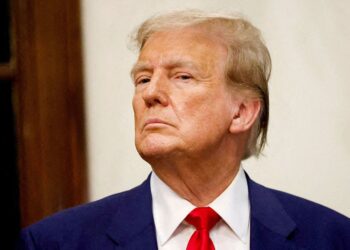The People’s Republic of China (PRC) and Russia are becoming closer than ever. The Biden administration is driving this, with enormous consequences for U.S. national security. Polling in Russia shows that the Russia people have positive opinions towards the PRC leadership (71% of Russians approve) as a result of Western support for Ukraine and sanctions against Russia. The PRC is increasing its oil purchases from Russia to boost the Russian economy in the face of Western economic sanctions. In addition, the PRC is heavily boosting exports to Russia both in quantity (up by about 50% thus far in 2023 by some estimates) and in type with far more exports of heavy machinery and vehicles. While the Russian approval of U.S. leaders has plummeted to about six percent. The reaction of the Russian people is not a surprise given the brutal war in Ukraine and the hostility of the Biden administration to all things Russian.
What is surprising is that this is not normal according to the logic of the balance of power. The U.S. and the PRC should be in great security competition because of all the threats they face, each is the most formidable threat to the other. Russia should be the tertius gaudens playing off both sides against the other or leaning towards the U.S. because the PRC is a greater threat to Russia due to the PRC’s territorial ambitions in Siberia and the Russian far east. The U.S. should be working with Russia against the PRC despite many other points of tension between Moscow and Washington.
Perversely, the PRC, the greatest threat to both Russia and the U.S., is the beneficiary of this situation. It advances Xi’s goal of overthrowing U.S. power and position in the world while forcing the world to yield to the PRC’s ambitions, the expansion of its military power and continued preparations for the invasion of Taiwan.
Xi benefits because Putin is the supplicant in the Sino-Russian relationship. This is entirely due to the decisions that Putin took. Putin’s embrace of Xi cost Putin his autonomy. Xi has Putin dependent upon him and thus has influence over Russian policy. Putin also serves as a lightning rod, attracting the world’s animus for his acts while Xi’s genocide in Xinjiang remains too often unremarked and in the background. It is an afterthought of the world’s conscience. As a consequence of Putin’s actions, Xi has secured his northern flank. Russian conventional and nuclear military power is now a tool to be employed in conjunction or apart from China’s military but to serve China’s interests. The U.S. has a "two front” problem with which it must contend.
Putin’s interest would have been better served by emerging as the third party, playing Beijing against Washington and the reverse. By leaning to one side, the perceived weaker side, he might have maximized Russia’s interests and freedom of action. Now that Putin has tied Russia’s interests to China, he will walk the path Xi requires of him. This will require Russia to accept diminished influence where Russia’s interest conflict with the PRC, such as in Central Asia, and to serve as an instrument of distraction for the U.S. and its NATO allies while China expands its military power and strategic ambitions.
In what must be a painful irony for Putin, a product of the Soviet system, that the Soviet Union’s dominance of China during the Cold War is now reversed. The PRC calls the shots in the relationship due to Putin’s strategic decisions. Having China’s northern and western flanks secured is a key step toward Xi’s greater belligerence, and Xi does not want to threaten this balance.
But it’s the Biden administration that has the strategic Midas touch in reverse. Biden turned a positive strategic situation, the growth of the PRC’s power threatens both the U.S. and Russia, into a strategic nightmare for the U.S.—Russia aligned with the PRC. A logical strategic policy would have been working with Russia—in conjunction with the Indians and others—against the PRC to deter its aggressive ambitions. But the Marxist progressive ideology of the Biden cannot allow permit that to occur. Instead, due to its hatred of Russia—a palpable hatred that the Russian people clearly perceive and which the opinion polling captures—Moscow is in an ever- tightening alliance with America’s existential enemy.
Rather than keeping the focus on what matters strategically, that is the enemy’s center of gravity, the Chinese Communist Party (CCP), which is especially true now that the CCP’s rule in perilous, the Biden administration’s ideology bests strategic logic. The Biden administration does not have the will to hold its radical and strategically dangerous ideological goals in check as advancing its ideology is its reason for being. The result of its ideological hatred should be directed against the CCP, a state committing genocide against its Muslim population, instead it is channeled against Russia. This is against all strategic logic and is a lost opportunity. The result is an increasingly bold Beijing that has enlisted Russia as a ally, ubiquitously undermines U.S. interests, and with whom, should deterrence fail, the U.S. may soon be at war.
When ideology trumps strategic logic, it can do so only temporarily. Napoleon, Hitler, the Japanese militarists, Mao Zedong, and the Soviet Union, attempted to do so and so incurred tremendously high costs before finally yielding to strategy. The United States possesses prodigious advantages, but it is not exempt from the logic of strategy.
Bradley A. Thayer is a Contributing Columnist for Warroom.




